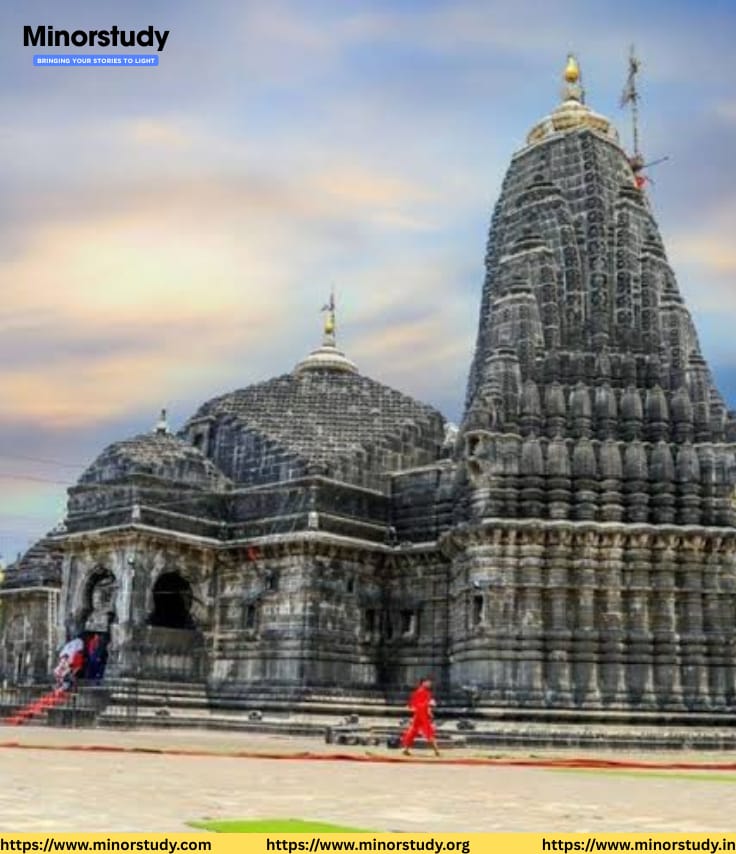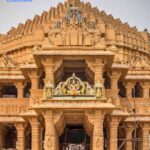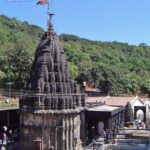🌟 Introduction
Trimbakeshwar Temple: Nestled at the foot of the Brahmagiri Hills in Nashik District, Maharashtra, the Trimbakeshwar Shiva Temple is a spiritual jewel of India. Revered as one of the 12 Jyotirlingas of Lord Shiva, this ancient temple draws millions of devotees each year. What sets it apart isn’t just its holiness, but its unique linga with three faces, symbolizing Brahma, Vishnu, and Mahesh—a rarity among Shiva temples.
- 🛕 History of Trimbakeshwar Temple
- 📆 Timeline of Trimbakeshwar Temple
- 📌 5 Unique and Astonishing Facts About Trimbakeshwar Shiva Temple
- 🔱 Significance of Trimbakeshwar Temple
- 🙏 Rituals and Observances
- ❓ Frequently Asked Questions (FAQs)
- 💫 Wishing and Blessings from Trimbakeshwar
- 🧠 Importance in Our Life and Daily Practice
- 🎯 Key Takeaways
- 🏁 Conclusion: The Divine Gateway to Inner Liberation
Beyond its religious aura, Trimbakeshwar is also the origin of the sacred Godavari River, making it both spiritually and geographically significant. Let’s explore its history, spiritual essence, unique facts, rituals, significance in modern life, and more—all presented in a way that truly resonates with today’s hearts and minds.
🛕 History of Trimbakeshwar Temple
The roots of the Trimbakeshwar Temple go back thousands of years, deeply intertwined with Indian mythology and divine lore.
📜 Mythological Origins: According to the Shiva Purana, Sage Gautama performed penance here after mistakenly committing a sin. Pleased with his devotion, Lord Shiva released the Ganga (Godavari) from this site, sanctifying it eternally.
🧱 Constructed by Peshwas: The current stone structure was built in the 18th century by Peshwa Balaji Baji Rao, showcasing traditional Hemadpanthi architecture.
🪔 Jyotirlinga Legend: The linga at Trimbakeshwar is eroding over time, symbolizing the cycle of creation and destruction, a central tenet of Shaivism.
📆 Timeline of Trimbakeshwar Temple
| Year/Period | Event Description |
|---|---|
| Vedic Era | Mentioned in early Hindu scriptures |
| Sage Gautama Era | Godavari river believed to originate here |
| 18th Century | Temple constructed by Peshwa Balaji Baji Rao |
| 20th Century | Declared a national heritage and protected site |
| Present Day | Administered by Trimbakeshwar Temple Trust and hosts lakhs of pilgrims annually |
📌 5 Unique and Astonishing Facts About Trimbakeshwar Shiva Temple
Three-Faced Jyotirlinga: Unlike any other Jyotirlinga, the one at Trimbakeshwar has three faces—Brahma, Vishnu, and Shiva, representing the Hindu Trinity.
Godavari Origin: This is the birthplace of the Godavari River, often called the Ganga of the South.
Pitrudosh Nivaran Rituals: Trimbakeshwar is a leading site for ancestral rites (Kaal Sarp Dosh, Narayan Nagbali, and Pind Daan).
Linga Erosion Mystery: The Shiva Linga here naturally deteriorates, believed to represent the fragility of human existence.
Navagraha Mandal: The temple complex houses Navagraha (nine planet deities) shrines, rare in Shiva temples.
🔱 Significance of Trimbakeshwar Temple
🧘 Spiritual Importance:
One of the 12 Jyotirlingas—most sacred Shiva shrines.
Considered the most powerful for removing Kaal Sarp Dosh and Pitra Dosh.
Bathing in Kushavarta Kund, adjacent to the temple, is said to wash away all sins.
🗺️ Geographical Significance:
Origin of the Godavari, lifeline to many Indian states.
Located near Nashik, a Kumbh Mela host city, elevating its importance every 12 years.
🧑🤝🧑 Societal Importance:
Boosts local economy through religious tourism.
Promotes ancient Vedic rituals, keeping traditions alive.
Educates the youth about spirituality and ancestral respect.
🙏 Rituals and Observances
🕯️ Daily Aartis and Rudrabhishekams are performed with full Vedic procedures.
🌑 Amavasya (New Moon Days) are considered ideal for Pind Daan and ancestral offerings.
🐍 Kaal Sarp Yog Puja, a ritual that helps remove negative planetary influences, is exclusively powerful here.
🚿 Pilgrims take a holy dip in the Kushavarta Kund before entering the temple.
🕉️ Shravan Maas, Mahashivratri, and Nag Panchami are celebrated with grandeur.
❓ Frequently Asked Questions (FAQs)
Q1: Who built the current structure of Trimbakeshwar Temple?
👉 The current temple was built in the 18th century by Peshwa Balaji Baji Rao.
Q2: Why is Trimbakeshwar special among Jyotirlingas?
👉 It’s the only Jyotirlinga with three faces representing Brahma, Vishnu, and Shiva.
Q3: Can women enter the sanctum sanctorum?
👉 As per temple norms, only male devotees are allowed in the inner sanctum for specific rituals.
Q4: What is the importance of Kaal Sarp Dosh Puja here?
👉 It is believed to nullify karmic debts and planetary curses, offering peace and progress.
Q5: How to reach Trimbakeshwar Temple?
👉 Nearest city: Nashik (30 km)
👉 Nearest airport: Ozar Airport or Mumbai Airport
👉 Easily reachable via road and rail.
💫 Wishing and Blessings from Trimbakeshwar
When people visit this sacred shrine, they often wish for:
Peace in the family and removal of ancestral curses
Relief from health and financial troubles
Marital harmony and progeny blessings
Spiritual progress and mental calm
🙏 Here’s a special wish you can share:
“May Lord Trimbakeshwar bless your life with stability, serenity, and spiritual clarity. Har Har Mahadev!”
🧠 Importance in Our Life and Daily Practice
Trimbakeshwar Temple has practical, emotional, and spiritual relevance for modern individuals:
🌱 In Daily Life:
Encourages regular introspection and karmic responsibility.
Promotes the practice of ancestral gratitude through rituals.
Boosts mental wellness through Vedic meditation and prayer.
💞 In Relationships:
Couples perform rituals here to strengthen bonds and overcome misunderstandings.
Families visit for Pitra Puja, improving generational karma and harmony.
🌏 In Society:
Preserves Indian heritage and Sanatan Dharma through living rituals.
Generates employment via pilgrimage tourism.
Encourages eco-awareness as the source of a major river system.
🎯 Key Takeaways
Trimbakeshwar is not just a temple—it’s a spiritual ecosystem.
One of the 12 Jyotirlingas, it represents Tridev—Brahma, Vishnu, and Mahesh.
The temple plays a vital role in ancestral, astrological, and religious practices.
The Kushavarta Kund and Godavari’s origin give it geographic sanctity.
Visiting Trimbakeshwar transforms not just fortunes, but also inner consciousness.
🏁 Conclusion: The Divine Gateway to Inner Liberation
In a world full of distractions and uncertainty, the Trimbakeshwar Shiva Temple remains a calm, divine presence where people come to cleanse their past, find their purpose, and reset their karmic compass. It reminds us of the impermanence of life and the permanence of the divine.
So, whether you are a seeker, a believer, or someone looking to reconnect with your roots, Trimbakeshwar opens its arms with timeless grace.
📢 Final Powerful Blessing:
“Let your life flow as purely as the Godavari that rises from Trimbakeshwar, and may Lord Shiva’s triple gaze guide you through all dimensions of time—past, present, and future.”








